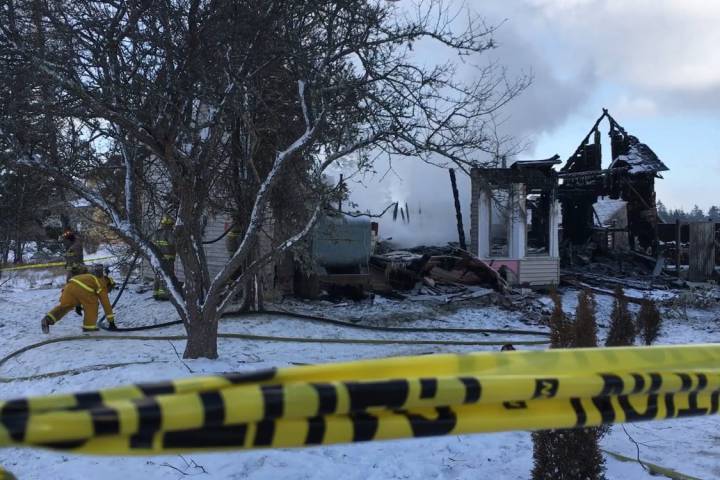A transparency expert is criticizing Nova Scotia’s decision to redact large portions of a fire marshal’s report on a fire that killed four young children in Pubnico Head, N.S., earlier this year.

The full report, obtained by Global News under Nova Scotia’s Freedom of Information Act, is heavily redacted, with descriptions of interviews, sections of analysis and large portions of how the fire marshal’s office concluded that the fire was an accident being removed from the report. Transparency advocates say it’s part of a troubling trend across Canada.
“We have to go with the ‘father knows best approach,’ that oh well, they must have done their due dilligence and they must have followed proper procedure, but we have no way of verifying that’s the case.”
The documents in the report paint a dramatic — if very limited — picture of the fire that swept through the Pubnico Head home on Jan. 7.

Get daily National news
According to Ron Thibeau, a fire marshal investigator, an unknown failure in the venting system of the home’s wood stove caused a fire to occur, which spread in the area and then quickly to the remainder of the structure.
Emma Kennedy and her common-law partner Phil Prouty escaped the fire, but Jayla Kennedy, 4, Mya Prouty, 7, four-month-old Winston Prouty and Mason Grant, 7, a cousin who was visiting for a sleepover, died.
The province had initially refused to release the cause of the fatal fire, although it eventually reversed course and released the information.
WATCH: ‘It’s never weak to speak’: first responders encouraged to seek help following Pubnico Head fire
_848x480_1133155907772.jpg?w=1040&quality=70&strip=all)
The full report released to Global News cites two exemptions in Nova Scotia’s Freedom of Information and Protection of Privacy Act that allows information to be redacted.
One is for privacy, which is used to redact people’s names, but in this case also for the report’s analysis of its conclusions and all of the information obtained in interviews. The second exemption is for when information could threaten someone else’s “safety or mental or physical health”, and was used to redact descriptions of the photographs taken by investigators.
Both the Office of the Fire Marshal and Nova Scotia’s Information and Privacy Office agreed on the use of the mental or physical health provision when redacting the document.
“As you are aware this was a very traumatic ordeal for the families involved, having even the descriptions of the photos released could result in considerable disturbance to the mental and physical well-being of the families,” wrote a representative of the province’s information and privacy office when questioned why it was used.
Holman said that the explanation makes sense and that they are using the legislation as it is, but that it comes at the cost of holding government accountable.
Holman says that the ability to understand the report and verify the conclusions reached by investigators is put at risk when documents are heavily redacted.
“You have to rely on the fire marshal’s word and that’s not how democracy is supposed to work,” he said.
“That’s what is troubling to me.”
- Real Canadian Superstore fined for ‘misleading’ Product of Canada displays
- Danielle Smith promises Alberta referendum over immigration, Constitution changes
- ‘No reason to continue discussing’: Ontario mayor wants Andrew’s name dropped
- Canadian Tire says Triangle Rewards are its ‘linchpin’ for growth







.jpg?h=article-hero-560-keepratio&w=article-hero-small-keepratio&crop=1&quality=70&strip=all)
Comments
Want to discuss? Please read our Commenting Policy first.